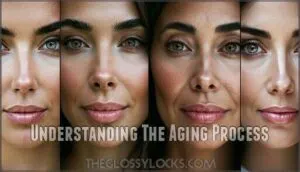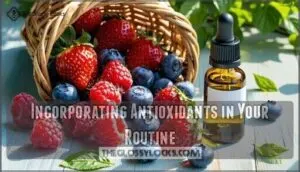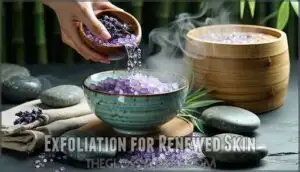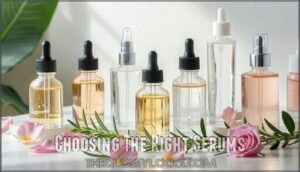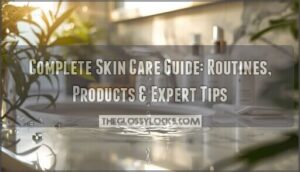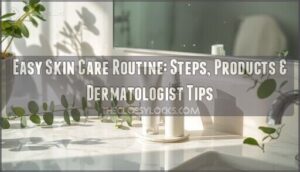This site is supported by our readers. We may earn a commission, at no cost to you, if you purchase through links.

You’ll want to start with three essential steps: gentle cleansing, antioxidant treatment, and thorough moisturizing. Use natural ingredients like vitamin C serums, hyaluronic acid, and plant-based oils that work with your skin’s natural repair process.
Don’t forget daily sunscreen—it’s your best defense against premature aging. Consistency matters more than expensive products.
Your skin renews itself every 28 days, so give any new routine at least a month to show results. The secret lies in understanding which natural ingredients target specific aging concerns most effectively, using natural ingredients and focusing on premature aging.
Table Of Contents
- Key Takeaways
- How to Create a Natural Anti Aging Skincare Routine?
- Understanding The Aging Process
- Importance of Sun Protection
- Cleansing for Aging Skin
- Incorporating Antioxidants in Your Routine
- Hydration and Moisturization Techniques
- Targeted Treatments for Fine Lines and Wrinkles
- Exfoliation for Renewed Skin
- Choosing The Right Serums
- Nighttime Regimen for Skin Renewal
- Lifestyle Factors in Anti-Aging Strategy
- Frequently Asked Questions (FAQs)
- What is a good anti-aging skin care routine?
- How do you make a good skin care routine?
- How do you prevent aging skin?
- How can I make my skin look younger?
- How to build an anti-aging skin care routine?
- How to take care of aging skin naturally?
- What is the best skin care routine to prevent aging?
- What is the best natural anti-aging ingredient?
- How to build an anti-aging skincare routine?
- How to care for aging skin naturally?
- Conclusion
Key Takeaways
- Start with the basics and stay consistent – You’ll need gentle cleansing, vitamin C serum, moisturizing, and daily sunscreen as your foundation. Consistency matters more than expensive products since your skin renews every 28 days.
- Protect your skin from sun damage religiously – You can prevent up to 80% of visible aging by applying broad-spectrum SPF 30+ daily, reapplying every two hours, and seeking shade between 10am-4pm when UV rays are strongest.
- Choose natural ingredients that actually work – You’ll get better results with proven natural options like vitamin C for collagen boost, hyaluronic acid for hydration, bakuchiol as a gentle retinol alternative, and rosehip oil for nourishment.
- Layer your products properly and give them time – You should apply serums to slightly damp skin, wait 5-10 minutes between layers, and stick with your routine for at least a month to see real results from your natural anti-aging approach.
How to Create a Natural Anti Aging Skincare Routine?
Building your natural anti aging skincare routine starts with understanding your skin’s needs.
You’ll want to cleanse, tone, and moisturize twice daily using natural ingredients like rosehip oil and vitamin C for collagen boost.
Exfoliate 2-3 times weekly to maintain skin elasticity.
DIY anti-aging treatments with bakuchiol can replace harsh retinols.
Routine consistency matters more than expensive products—your skin responds best to gentle, regular care with proven natural skincare ingredients.
Consider that niacinamide minimizes pores for ideal results.
Understanding The Aging Process
Your skin doesn’t wake up one morning suddenly showing signs of age.
Your skin whispers its age story gradually—listen carefully and respond with gentle, consistent care.
The aging process happens gradually through several key changes happening beneath the surface.
As you age, cell turnover slows down substantially, meaning your skin takes longer to shed dead cells and reveal fresh ones underneath.
This creates that dull, uneven complexion you might notice.
Collagen production also decreases year after year, reducing skin elasticity and leading to fine lines wrinkles.
Your body’s hormonal shifts affect how your skin behaves, often causing dryness and thinning.
Meanwhile, sebum reduction leaves aging skin feeling less resilient and more prone to irritation.
UV ray exposure substantially contributes to this process.
Cellular damage from free radicals and environmental stressors accumulates over time, accelerating visible aging signs.
Understanding these natural changes helps you choose the right ingredients and treatments that actually work with your skin’s needs rather than against them.
Importance of Sun Protection
Understanding aging processes prepares you for the next critical step: shielding your skin from its biggest enemy. Sun protection forms the backbone of any effective natural anti aging skincare routine, preventing up to 80% of visible aging signs.
UV rays cause photoaging prevention challenges through two main types: UVA protection needs never stop (they penetrate clouds and windows), while UVB radiation peaks midday. Both trigger skin cancer risks and premature aging.
Here’s your sun protection arsenal:
- Apply broad-spectrum SPF 30+ daily – even on cloudy days when UV rays still reach your skin
- Reapply every two hours during outdoor activities for consistent sunscreen application effectiveness
- Seek shade between 10am-4pm when UV rays reach their most damaging intensity levels
- Wear protective clothing and wide-brimmed hats as your first line of defense against harmful radiation
- Use antioxidant serums underneath sunscreen to boost your skin’s natural defense mechanisms against free radicals
Remember: yesterday’s sun damage can’t be undone, but today’s anti aging tips can prevent tomorrow’s wrinkles. Regular dermatology check-ups help with skin cancer prevention. Your future self will thank you for making sun protection a non-negotiable part of your skincare routine.
Cleansing for Aging Skin
Your face deserves the royal treatment, especially as time adds character to your features. Gentle cleansers become essential for aging skin that’s more delicate and prone to dryness.
Your skin is your body’s largest organ—treat it with the respect and care it deserves every single day.
Oil cleansing effectively removes makeup while preserving natural moisture, while cream cleansers offer hydrating benefits.
| Cleanser Type | Best For | Key Benefit |
|---|---|---|
| Oil-based | Makeup removal | Deep cleansing without stripping |
| Cream | Dry, mature skin | Extra hydration |
| Gel | Normal to oily | Balanced cleansing |
pH balance matters—choose natural cleansers with pH 5.5-6.5.
Cleansing frequency should be twice daily for your natural anti aging skincare routine.
Incorporating Antioxidants in Your Routine
After cleansing your skin properly, you’ll want to add powerful protection against free radical damage.
Antioxidants are your skin’s bodyguards, neutralizing harmful molecules that accelerate aging.
Vitamin C leads the pack, boosting collagen production by 80% and brightening skin within four weeks of consistent use.
Here’s how to maximize antioxidant sources in your natural anti aging skincare routine:
- Apply vitamin C serum to damp skin each morning for enhanced absorption
- Layer topical application products from thinnest to thickest consistency
- Include dietary antioxidants like berries and green tea for internal support
- Combine specific antioxidants like vitamin E with C for 400% greater protection
This natural skincare approach delivers clinical results.
Oxidative stress can lead to cellular breakdown, but antioxidants neutralize damage.
Hydration and Moisturization Techniques
While antioxidants shield your skin from damage, proper hydration works like a plumbing system that keeps everything flowing smoothly.
Your skin’s natural moisture barrier weakens with age, making hydration skincare absolutely essential for any antiaging skincare routine.
Toners: Choose alcohol-free formulas that prep your skin for better product absorption.
Natural hydrating ingredients help restore your skin’s pH balance.
Face Masks: Apply hydrating masks twice weekly using ingredients like honey, aloe vera, or oatmeal.
These natural moisturizers deliver intensive skin moisture while you relax.
Oil Layering: Start with lightweight serums containing humectant benefits like hyaluronic acid, then seal with occlusive agents such as jojoba or rosehip oil.
This technique locks in skin hydration effectively.
Remember internal hydration matters too – drinking water supports your skin from within.
Think of moisturization as feeding your skin’s thirst.
Consistent hydration creates that plump, youthful appearance you’re after.
To combat aging, consider using broad-spectrum sunscreen daily.
Targeted Treatments for Fine Lines and Wrinkles
Targeting specific problem areas requires a strategic approach to your antiaging skincare routine.
Retinol alternatives like bakuchiol offer gentler wrinkle-fighting power without irritation. Peptide serums boost collagen production, plumping fine lines effectively.
Facial massage with natural oils stimulates circulation and enhances product absorption. Consider natural fillers like hyaluronic acid masks for instant hydration.
Spot treatments containing vitamin C or plant extracts address stubborn wrinkles directly. Explore options with gentle anti-aging properties for sensitive skin.
These targeted treatments work synergistically with your natural anti aging routine, delivering visible results for smoother, firmer skin over time.
Exfoliation for Renewed Skin
Dead skin cells pile up like old newspapers, dulling your complexion and blocking skincare absorption. Exfoliation jumpstarts skin cell renewal by clearing this cellular debris.
Chemical vs. physical methods offer different approaches—gentle exfoliation with enzymes suits sensitive skin, while oatmel lavender scrub provides natural physical buffing.
Exfoliation frequency matters: start twice weekly, adjusting based on skin sensitivity. Quality exfoliators and proper exfoliation tools make the difference.
Exploring various tool options can help you find the perfect fit for your skin type and routine.
Always follow post-exfoliation care with moisturizer and sunscreen, as freshly revealed skin needs protection from environmental damage.
Choosing The Right Serums
You’ll find that serums pack powerful anti-aging ingredients like vitamin C, hyaluronic acid, and retinol into lightweight formulas that penetrate deeper than regular moisturizers.
The key is matching the right serum to your specific skin concerns, whether you’re targeting fine lines, dark spots, or loss of firmness, with complete concepts and specific skin concerns being crucial.
Serum Ingredients
Select serums that deliver proven results for your natural anti aging skincare routine.
Vitamin C brightens skin while boosting collagen production by up to 40%. Hyaluronic Acid holds 1,000 times its weight in water, plumping fine lines within weeks.
Peptide Serums enhance firmness, while Plant Extracts like bakuchiol offer Retinol Alternatives without irritation for sensitive skin.
Consider serum product options for best results.
Serum Application
Proper application makes the difference between wasted product and visible results. Your serum application technique determines how well those powerful ingredients penetrate your skin and deliver their anti aging benefits.
Application Frequency matters more than you think. Most serums work best when applied once or twice daily, but always follow product instructions. Absorption Time varies by formulation – water-based serums absorb within minutes, while oil-based versions need longer.
Here’s your step-by-step approach:
- Apply to clean, slightly damp skin for better penetration
- Use gentle patting motions rather than rubbing to avoid irritation
- Wait 5-10 minutes before applying moisturizer for ideal Layering Techniques
Application Tools aren’t necessary – clean fingertips work perfectly. Store serums properly in cool, dark places to maintain potency in your natural anti aging skincare routine.
Serum Benefits
Your face serum delivers concentrated power that regular moisturizers can’t match.
These lightweight formulas excel at skin penetration, diving deep into your skin’s layers for targeted delivery of active ingredients.
Think of serums as your skin’s personal trainer—they work harder and faster than other products.
The benefits are impressive: enhanced serum absorption means ingredients like vitamin C and hyaluronic acid reach where they’re needed most.
You’ll notice a hydration boost that plumps fine lines, while antioxidants support collagen boost for firmer skin.
Regular use improves skin elasticity and overall texture improvement.
This natural anti aging approach transforms your skin hydration levels, creating a smoother, more youthful complexion that glows from within.
Nighttime Regimen for Skin Renewal
Your skin works hardest while you sleep, making your nighttime regimen vital for natural anti aging.
During sleep, cell turnover increases dramatically and repair actives penetrate deeper.
Here’s your PM routine:
- PM Cleansing: Double-cleanse to remove daily buildup
- Retinol application: Apply before moisturizer for maximum effectiveness
- Hydrating serum: Choose lactic acid for gentle exfoliation
- Overnight hydration: Use peptide-rich moisturizer to lock moisture
- Eye treatment: Target delicate under-eye area
- Weekly derma rolling: Boost collagen production
- Sleep quality: Get 7-8 hours for peak skin renewal
Lifestyle Factors in Anti-Aging Strategy
Your skincare products can’t do all the heavy lifting in terms of aging gracefully – what you eat, how you sleep, and your daily habits play equally important roles in maintaining youthful skin.
Making smart lifestyle choices creates the perfect foundation for your natural anti-aging routine to work more effectively.
Natural Moisturisers
Transform your aging skin with plant-based oils and DIY moisturizers that deliver real results.
These natural ingredients offer superior hydration benefits through their humectant properties.
Create custom moisturizer ingredients blends using jojoba, rosehip, or argan oils.
Your skin drinks up these natural skincare solutions better than synthetic alternatives.
These anti aging tips help restore your skin’s natural barrier while keeping natural moisturizers simple yet effective.
Anti-Ageing Foods
Beyond topical treatments, your anti aging diet fuels skin health from within. What you put on your plate directly impacts collagen production and cellular repair.
- Antioxidant-rich foods: Blueberries and red bell peppers contain vitamins C and E that protect against free radical damage while supporting natural collagen synthesis.
- Collagen-boosting foods: Papaya provides vitamin C and papain enzyme for skin renewal, while leafy greens supply essential minerals for cellular function.
- Hydrating fruits: Water-rich options like cucumber and watermelon maintain skin moisture levels naturally.
- Healthy fats: Olive oil and avocados reduce inflammation while enhancing skin elasticity through beneficial polyphenols and unsaturated fats.
Exfoliating Techniques
When building your natural skincare arsenal, gentle exfoliation becomes your secret weapon against aging.
Choose between Physical Exfoliants like oatmeal scrubs or Enzyme Exfoliation using papaya masks. Skip harsh Chemical Peels and Microdermabrasion for gentler options.
Follow proper Exfoliation Frequency—twice weekly max—to avoid irritation. Natural exfoliators reveal fresh, glowing skin without damaging your protective barrier.
Frequently Asked Questions (FAQs)
What is a good anti-aging skin care routine?
Forget expensive miracle creams—you’ll need gentle cleansing, vitamin C serum, retinol at night, and daily SPF.
Add hyaluronic acid for hydration.
Consistency beats fancy packaging every time for younger-looking skin.
How do you make a good skin care routine?
Start by identifying your skin type through simple observation.
Choose gentle cleanser, moisturizer, and sunscreen that match your needs.
Introduce one new product weekly, patch test everything, and stick with what works consistently.
How do you prevent aging skin?
You’ll protect your skin by using sunscreen daily, staying hydrated, and applying gentle moisturizers with antioxidants.
Don’t smoke, limit alcohol, eat nutrient-rich foods, and incorporate retinol or vitamin C serums into your routine.
How can I make my skin look younger?
You’ll achieve younger-looking skin by using vitamin C serums, retinol treatments, and hyaluronic acid moisturizers.
Don’t forget daily sunscreen, gentle exfoliation twice weekly, and facial massage with rosehip oil to boost collagen production naturally.
How to build an anti-aging skin care routine?
Think of your skin as a garden—it needs consistent care.
Cleanse gently, exfoliate weekly, and moisturize with serums like hyaluronic acid.
Add sunscreen daily and consider retinol at night to support collagen and reduce wrinkles.
How to take care of aging skin naturally?
You’ll want to massage your face with natural oils like rosehip or jojoba daily.
Use gentle exfoliants, apply vitamin C serums, stay hydrated, and protect from sun damage.
While maintaining consistent sleep patterns.
What is the best skin care routine to prevent aging?
Like a garden that needs daily tending to flourish, your skin thrives with consistent care.
Start with gentle cleansing, add vitamin C serum, moisturize with hyaluronic acid, and never skip sunscreen—it’s your skin’s best friend.
What is the best natural anti-aging ingredient?
Retinol stands as the gold standard, but vitamin C serum offers the best natural alternative.
You’ll see brighter skin, reduced fine lines, and boosted collagen production.
It’s gentle, effective, and works beautifully with other ingredients, making vitamin C serum a great choice for those looking for a natural and effective skincare solution.
How to build an anti-aging skincare routine?
Building your anti-aging routine isn’t rocket science, but consistency works miracles.
Start with gentle cleansing, add vitamin C serum mornings, retinol evenings, moisturizer twice daily, and sunscreen religiously.
Your future self will thank you, and remember consistency is key to making these habits effective.
How to care for aging skin naturally?
You’ll naturally slow aging by using gentle plant oils like rosehip and jojoba.
Adding antioxidant-rich green tea toner, massaging with sweet almond oil, and protecting from sun damage are crucial steps.
While maintaining consistent hydration is also key, all these methods combined help to naturally slow aging.
Conclusion
Research shows that 80% of visible aging comes from sun exposure, not genetics.
Building how to create a natural anti aging skincare routine doesn’t happen overnight, but you’ll see improvements within four weeks.
Start with gentle cleansing, add vitamin C serum, and never skip sunscreen.
Your skin responds better to consistent natural ingredients than expensive harsh chemicals.
Remember, patience beats perfection—stick to your routine, and you’ll develop healthy aging habits that protect your skin for years ahead, with a focus on natural ingredients.
- https://vibrantskinbar.com/blog/best-natural-skin-care-routine/
- https://continentalhospitals.com/blog/natural-remedies-and-diy-masks-for-reducing-fine-lines-and-wrinkles/
- https://pmc.ncbi.nlm.nih.gov/articles/PMC9610014/
- https://pubmed.ncbi.nlm.nih.gov/33354858/
- https://www.hsph.harvard.edu/nutritionsource/collagen/

